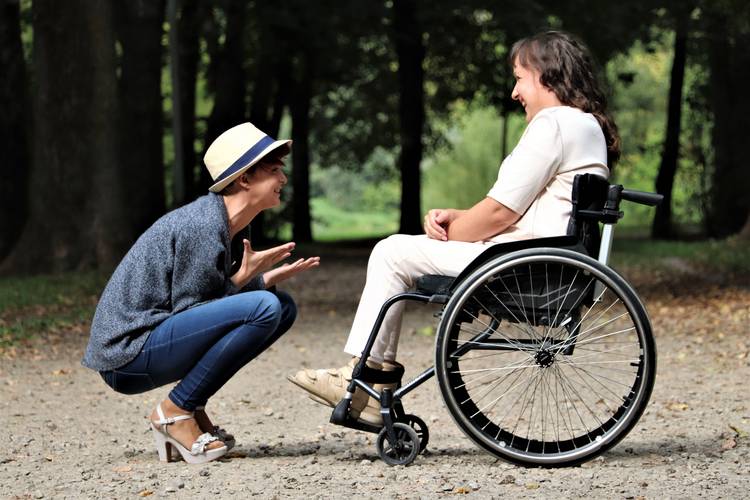If the personal assistance user is waived assistance only because they do not fulfil the RVT condition, this presents an intervention in the rights of the disabled as per Article 52 of the Slovenian Constitution. The competent ministry confirmed the Ombudsman’s opinion and provided for an appropriate amendment of the regulation.
* * *
The Human Rights Ombudsman of the Republic of Slovenia (the Ombudsman) received a large number of complaints referring to the fulfilment of the RVT condition of personal assistance users. The complaints warned about problems which people who had not recovered from COVID-19 or had not been vaccinated faced due to the testing requirement every 48 or 72 hours, i.e. with regard to accessing testing spots and the payment of tests.
Ordinance on the method of meeting the condition of morbidity, vaccination and testing to curb the spread of SARS-CoV-2 virus infections (Ordinance), valid until 18 September 2021, determined in the third paragraph of Article 5 that (inter alia) the RVT condition does not have to be fulfilled by persons included in the service of guidance, protection and employment under special conditions. In the first paragraph of Article 6, the Ordinance stipulates that all people who carry out work for an employer on any legal basis or who perform an activity independently fulfil the RVT condition if they carry out a rapid antigen self-test in the workplace. In accordance with the third paragraph of Article 8 of the Ordinance, self-testing suffices for participants in adult education, whereas funds for the payment of tests are also provided from the state budget in accordance with the first paragraph of Article 10 of the Ordinance.
According to the Ombudsman’s opinion, personal assistance users, including contact with the personal assistant, do not represent a greater risk of spreading COVID-19 than people who are included in guiding, protection and employment service under special conditions, and there are no reasons for them to be treated more strictly than employees in workplaces. It should be emphasised that it is completely unfeasible for many personal assistance users to ensure attendance at the testing site every 48 or 72 hours, and the test payment can also be a huge material burden for them. The acquisition of an appropriate medical certificate can also present a great problem for individuals who cannot be vaccinated due to their health condition.
Therefore, the Ombudsman proposed that the Ministry of Labour, Family, Social Affairs and Equal Opportunities (MDDSZ) guarantees that personal assistance users be considered an exception with regard to the RVT condition or at least that they should be given the option to acknowledge the rapid antigen self-test, which should be offered to them free of charge or at least to offer them rapid testing in their homes, whereas such testing costs should be covered by the state budget.
The MDDSZ explained that they are aware of the diversity of personal assistance users’ handicaps, therefore, they provided a proposal for the modification of the Ordinance and to exclude personal assistance users from fulfilling the RVT condition. The Amending Ordinance (Official Gazette of the Republic of Slovenia, No. 149/21) determines that personal assistance users are stipulated as an exception in fulfilling the RVT condition in the sense of carrying out personal assistance. This means that the user who receives urgent personal assistance does not have to fulfil the RVT condition. The process of determining the “necessity of implementation of personal assistance” was transferred to personal assistance providers who have an insight into the lives and needs of every individual user. The Ministry believes that the exception included all personal assistance users for whom testing is unfeasible or can be difficult as per the current ordinance. The remaining personal assistance users can also move freely in the public space, where the RVT condition must be fulfilled as per the ordinance, therefore, the exception would not make any sense.
Therefore, the Ombudsman assessed that there should be no objections to the implementation of personal assistance merely for the reason that the user does not fulfil the RVT condition. “Emergency personal assistance” was explicitly excluded from the fulfilment of the RVT condition in the Ordinance. According to the MDDSZ, the determination of necessity is left to the personal assistance providers. The criteria concerning when personal assistance is necessary have not been determined. Therefore, according to the Ombudsman’s opinion, every personal assistance provider has considerable problems in explaining the reasons why the implementation of personal assistance would be determined as not urgent. The Ombudsman has not been informed whether any problems have subsequently occurred in practice. 9.6-27/2021

![[Translate to English:] Osebni asistent ob invalidki](/fileadmin/_processed_/5/9/csm_INVALIDKA_NA_VOZICKU_beea12edc6.jpg)